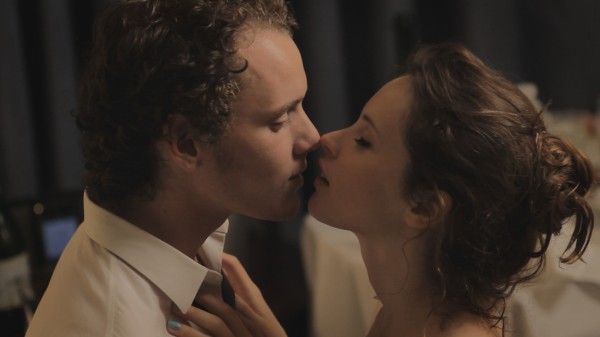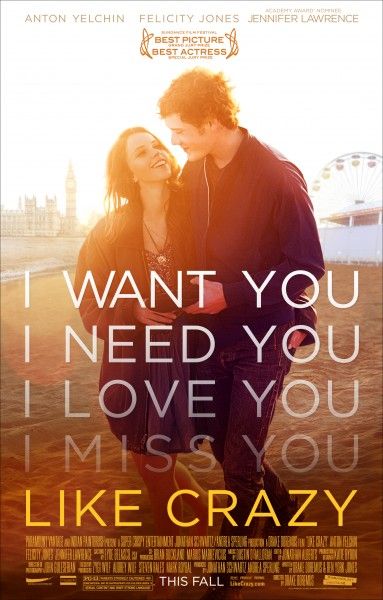[This is a re-print of my review from the 2011 Sundance Film Festival]
We should be able to relate to movies on an emotional level, but that connection shouldn’t be contingent solely on an individual’s personal experience. Like Crazy works, but only in a manipulative fashion that preys on the viewer’s nostalgia of young love. While lead actors Anton Yelchin and Felicity Jones give solid performances, the love between their characters is left as vague as possible so that the viewer can project their own feelings onto the picture. If thoughts of your first love make your heart skip a beat, Like Crazy will likely send you reeling. If, however, you’re like me and aren’t impressed by watching other people deal with their relationship issues, Like Crazy will leave you cold.
The film charts the relationship between Jacob (Yelchin) and Anna (Jones). The two meet while in college in Los Angeles and through one of the film’s many, many montages (a lazy narrative shortcut that substitutes for showing genuine development of their romance) we see them fall in love and then the film’s major conflict arises: Anna has to go back to England before her student visa expires. However, because the two are so in love, they decide that bucking U.S. immigration law isn’t that big of a deal. Anna returns to England for a wedding, but when she tries to re-enter the U.S., she discovers that the U.S. Immigration is determined to stop terrorists, halt illegal immigrants, and kill burgeoning romances. Anna and Jacob are then forced to confront how to continue to their relationship despite being an ocean apart.
Writer-director Drake Doremus uses plenty of visual flourishes to spruce up the narrative, but they rarely emphasize the drama. It’s difficult to care about Jacob and Anna because they’re so poorly defined. They both like Paul Simon, he designs furniture, she’s a writer, and that’s about it. It’s a bare minimum of development because the film invites the viewer to see himself or herself in Jacob and Anna, and that’s a cheap trick. If you find yourself caring about these characters, it’s most likely because you care about yourself and how your personal experience relates to the broad outline of theirs.
Yelchin and Jones give good performances, but Doremus constantly overshadows them with look-at-me editing and cinematography. This is a character-driven film, but Doremus seems reluctant to give the film over to his actors. The camera is like a voyeur with ADD and rarely sits still long enough to give Yelchin and Jones and chance to shine. That’s a major disappointment since I’m a tremendous fan of Yelchin and I felt like he could have really delivered a powerhouse performance if the camera and editing actually complimented his performance rather than competed with it. As for Jones, I wasn’t familiar with her until this movie, but her work here has definitely put the young actress on my radar.
The pain and yearning of young love is a widely-experienced, but not universal. Like Crazy only works as far as you’re able to project your own life on to it. That’s not the film’s accomplishment. That’s your accomplishment and Like Crazy wants to steal it and take your lived-in emotions as its own.
Rating: D+



